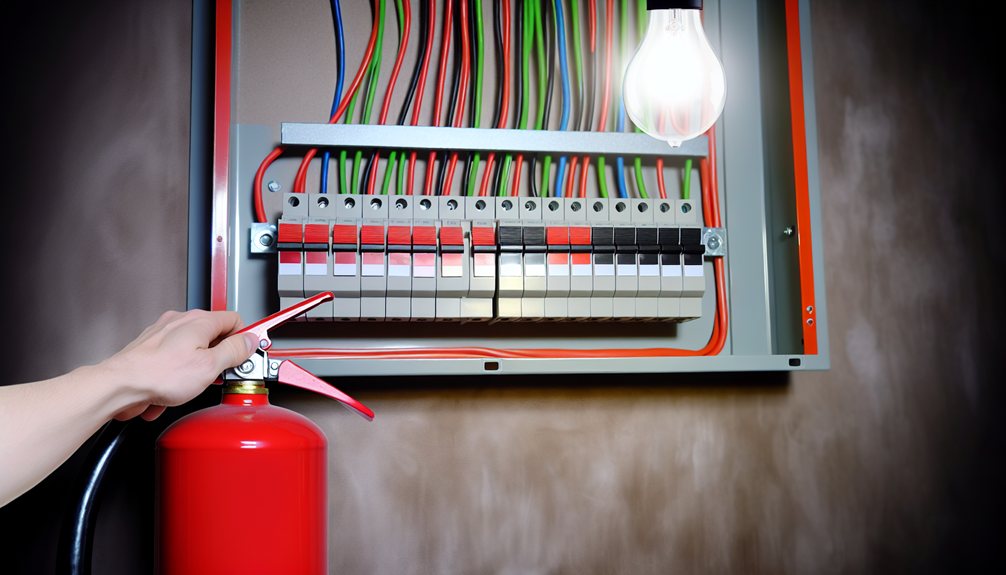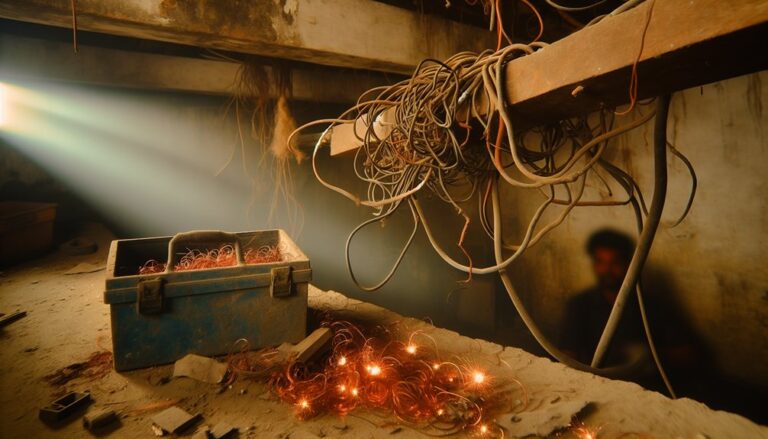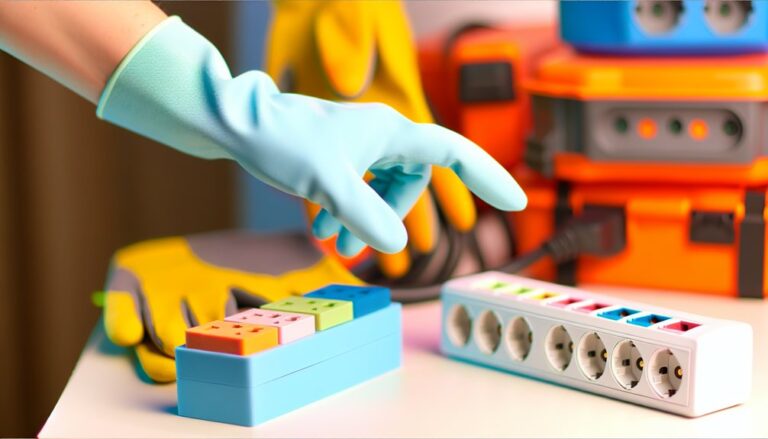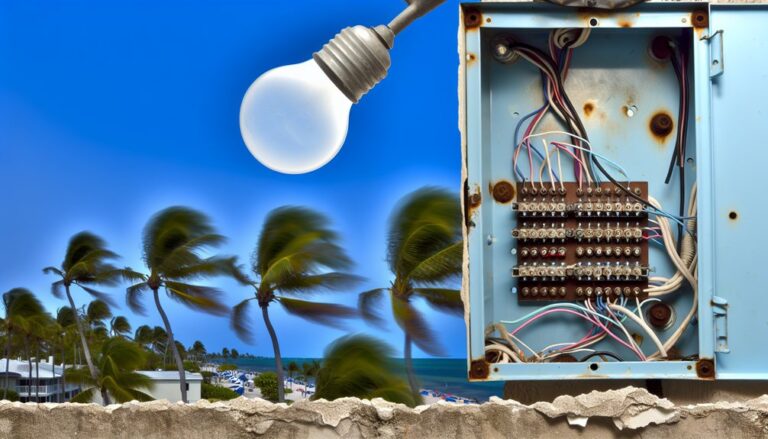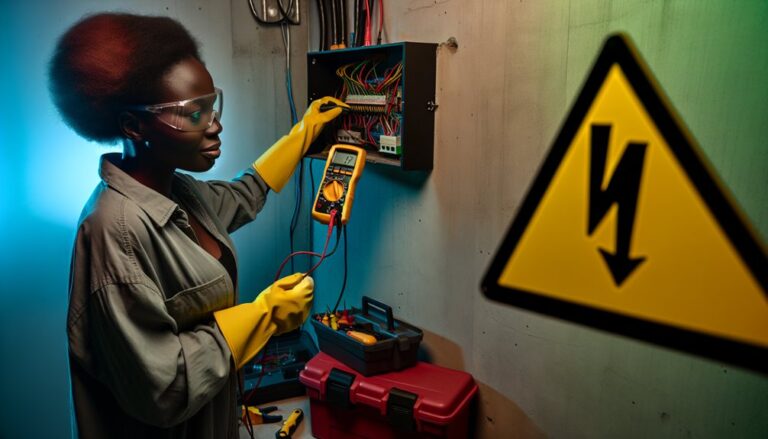Reducing Risk of Electrical Fires
To reduce the risk of electrical fires, regularly inspect your wiring and appliances. Look for frayed cords and guarantee circuits aren’t overloaded. Use appropriate wire gauges and verify outlets match appliance requirements. Utilize surge protectors and circuit breakers to manage electrical surges and overloads. Implementing these safety measures not only minimizes fire hazards but also extends the lifespan of your devices. There’s much more to learn about enhancing electrical safety in your home.
Key Takeaways
- Schedule regular electrical inspections every one to three years to identify potential hazards like frayed wiring and overloaded circuits.
- Use appropriate wire gauges to match current loads, ensuring proper installation to prevent overheating and electrical failures.
- Regularly inspect and maintain electrical cords and appliances, unplugging unused devices to minimize fire risks and save energy.
- Utilize surge protectors and circuit breakers to protect devices from voltage spikes and prevent overloads that can cause fires.
- Avoid overloading outlets by limiting the number of devices connected, and ensure all outlets are properly grounded for safety.
Understanding the Common Causes of Electrical Fires
Understanding the common causes of electrical fires is essential for preventing potential disasters in your home or workplace. One major factor is faulty wiring, which can stem from age, improper installation, or damage. These issues often lead to arcing or overheating, creating a significant fire risk.
Additionally, overloaded circuits occur when you connect too many devices to a single outlet or circuit. This overload generates excessive heat, increasing the likelihood of ignition.
You should routinely check your electrical systems for signs of wear or overuse. By recognizing these hazards early, you can take proactive measures to mitigate risks, ensuring a safer environment for you and those around you.
Stay vigilant and prioritize electrical safety to protect your property.
Importance of Regular Electrical Inspections
Regular electrical inspections are essential for maintaining safety and preventing hazards in your home or workplace. These assessments help identify potential issues such as frayed wiring, overloaded circuits, and faulty connections before they lead to catastrophic failures.
The importance of regular inspections can’t be overstated; they greatly reduce the risk of electrical fires, guaranteeing compliance with safety standards. Establishing an appropriate inspection frequency—typically every one to three years—depends on the age of your electrical system and the type of environment.
Safe Usage of Electrical Appliances
While you may rely on electrical appliances for daily tasks, it’s crucial to use them safely to prevent accidents and minimize fire risks. Regular appliance maintenance not only prolongs the lifespan of your devices but also enhances energy efficiency. Here are key practices to guarantee safety:
| Practice | Description | Benefits |
|---|---|---|
| Inspect Cords | Check for frays and damage. | Reduces risk of short circuits. |
| Unplug When Not in Use | Disconnect unused devices. | Saves energy and reduces fire risk. |
| Avoid Overloading | Don’t exceed recommended wattage. | Prevents overheating. |
| Use Proper Outlets | Verify compatibility with your appliances. | Enhances safety and efficiency. |
Implementing Proper Wiring Practices
When you implement proper wiring practices, you can greatly reduce the risk of electrical fires in your home.
Start with wire gauge selection; using the correct gauge guarantees that the wires can handle the current load without overheating. For instance, a 14-gauge wire is suitable for 15-amp circuits, while a 12-gauge wire is required for 20-amp circuits.
Additionally, grounding techniques play a vital role in safety. Confirm all outlets and electrical devices are properly grounded to prevent electrical surges and reduce shock hazards.
Regularly inspect connections and make certain they’re tight and secure. By adhering to these practices, you considerably minimize the risk of electrical failures that can lead to devastating fires.
Utilizing Surge Protectors and Circuit Breakers
To safeguard your home from electrical fires, utilizing surge protectors and circuit breakers is essential. Surge protector effectiveness hinges on their ability to divert excess voltage, preventing damage to your devices. Meanwhile, circuit breaker functionality involves automatically cutting off electrical flow in the event of overloads or short circuits, thereby minimizing fire risks. By integrating these devices into your electrical system, you enhance safety and longevity for your home appliances.
| Device Type | Purpose | Key Feature |
|---|---|---|
| Surge Protector | Diverts excess voltage | Protects devices from surges |
| Circuit Breaker | Interrupts faulty currents | Prevents overload fires |
| Power Strip | Multiple outlets | Often includes surge protection |
| GFCI Outlet | Prevents shocks | Detects ground faults |
Establishing a Fire Safety Plan
How prepared are you in the event of an electrical fire? Establishing a fire safety plan is essential for your safety and that of your loved ones.
Start by identifying clear fire escape routes from every room, making sure they’re free of obstructions. Regularly practice these routes to confirm everyone understands how to exit quickly.
Designate a meeting point outside your home to account for every person. Keep a list of emergency contacts, including local fire services and family members, easily accessible.
It’s important to review and update your safety plan regularly, especially after any major changes in your living environment. This proactive approach not only prepares you for emergencies but can greatly reduce panic during a crisis.
Educating Your Family on Electrical Safety
While electrical safety may not seem urgent, understanding its principles can prevent potential disasters in your home.
Start by organizing family workshops to educate everyone about basic electrical hazards, such as overloaded outlets and frayed wires. Discuss the importance of using appliances correctly and the dangers of using them near water.
Incorporate safety drills focused on electrical emergencies—practice what to do if a fire starts due to electrical issues. Make sure your family knows how to identify potential risks and whom to contact in case of emergencies.
Regularly review safety protocols and encourage open communication about any electrical concerns. By fostering a culture of safety, you empower your family to recognize hazards and respond effectively to potential dangers.
About Us
We understand that electrical issues can be stressful and overwhelming. That’s why we are here to lend a helping hand and provide you with the best electrical services in town. As a team of experienced electricians, we take pride in our ability to solve any electrical problem with precision and care.
Pages
Follow us
© 2026 By Electrician Fort Lauderdale Today

